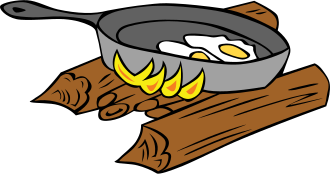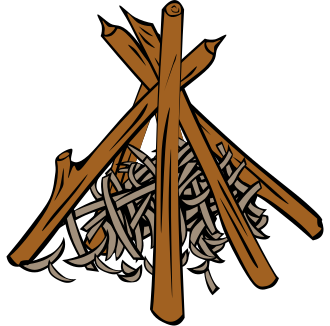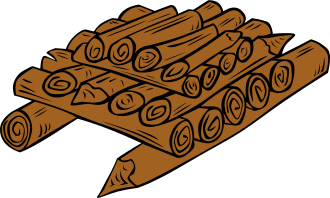Translations:AY Honors/Fire Building & Camp Cookery/Answer Key/63/en
Note that the requirement is to lay these fires, and that lighting them is optional. You may wish to have your Pathfinders lay all of them, and then light only one. This allows you to lay all of them in the same place without having to contend with hot coals, or having to tend several fires at once.
Hunter's Fire
The hunter's fire is a cooking fire. The logs on top are spaced close enough together such that a pot, pan, or Dutch oven can be placed on them. Try to lay it as level as possible.
Reflector Fire
This fire can be used for baking, though it is not as efficient as a reflector oven (which is has a metallic reflecting surface and often surrounds the item. The fire itself can be of any other form, and is placed in front of the reflector. The item to be baked is placed between the reflector and the fire. This fire is also good for getting oneself warm. The reflector can also be a large rock. If you sit (or sleep) between the reflector and the fire, the side of you facing the fire will be warmed directly, while the reflector throws heat to the opposite side. Very toasty.
If making the reflector from logs, the vertical members should be driven deeply into the ground to support the weight of the horizontal members. You can also use rocks to support them.
Star Fire
The advantage of this fire is that the logs can be of any length, avoiding the need to cut them up. As the ends of the logs burn, they are pushed into the fire. The fire is lit at the center of the star. If the logs are propped up on the fire ring, gravity will feed them in as they burn.
Teepee Fire
The teepee fire is probably the most recognized campfire. It is somewhat difficult to lay however, as getting the logs to balance against one another can be tricky. Sometimes the log pile will topple and upset the kindling and tinder beneath, and you'll have to start again from scratch. If necessary, you can lash them together at the top with twine (but don't use a synthetic rope such as nylon or polypropylene). Once laid, the teepee fire is very easy to light, as convection will take the flames right to the fuel.
Adding fuel to a teepee fire can also be challenging as the balance problem is still there, but it is now complicated by the presence of heat. For this reason, teepee fires often devolve into a chaotic heap.
Log Cabin Fire
The log cabin fire is easy to lay, and it is fairly stable as well. It is laid very much like a log cabin (hence the name). It is somewhat difficult to light though, as the fuel is off to the side of the tinder and kindling. When it burns, it falls in on itself, confining itself to the fire ring. It is also easy to add more fuel and maintain a neat and orderly fire.
Council Fire
The council fire was used by Native Americans during their meetings (or councils). It is very much like the log cabin fire except that more than two logs are laid on each layer. Be careful not to lay the logs too close to one another. Leave gaps of at least one inch (2.5 cm) between each log to allow air to circulate. Like the log cabin fire, the council fire is very stable, and it falls into itself as it burns, remaining within the fire ring. Unlike the log cabin fire, the council fire lights easily as the main fuel is located directly above the kindling and tinder where convection will carry the flames. This fire is hot, and will make a nice bed of coals for cooking. It also uses a lot of fuel. This fire is sometimes called a pyramid fire as well.






